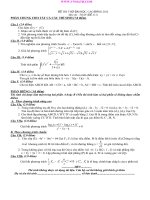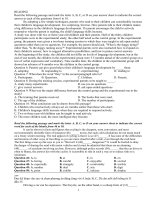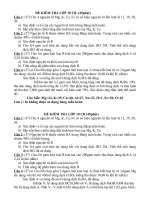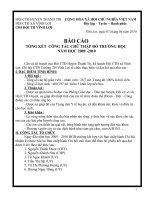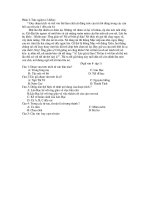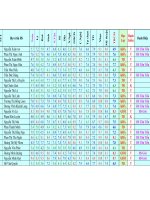GCSE 211
Bạn đang xem bản rút gọn của tài liệu. Xem và tải ngay bản đầy đủ của tài liệu tại đây (71.3 KB, 5 trang )
SƠ GD&ĐT VINH PHUC
TRƯƠNG THPT LIỄN SƠN
(Đề thi gồm: 05 trang)
ĐỀ KSCL ÔN THI THPT QG NĂM HỌC 2019-2020
BÀI THI MƠN: TIẾNG ANH 211
Thời gian làm bài: 60 phút, khơng kể thời gian phát đề
Ho va tên thi sinh:……………………………………………………………………. SBD:…………………………
Mark the letter A, B, C, or D on your answer sheet to indicate the word whose underlined part
differs from the other three in pronunciation in each of the following questions.
Question 01. A. applied
B. naked
C. supposed
D. caused
Question 02. A life
B. tight
C. child
D. children
Mark the letter A, B, C, or D on your answer sheet to indicate the underlined part that needs
correction in each of the following questions.
Question 03. The rings of Saturn are so distant to be seen from the Earth without a telescope.
A. of
B. so
C. be
D. without
Question 04. Stand up straight, breathe deeply, hold your head up, and no look down!
A. straight
B. deeply
C. head up
D. no look
Question 05. Everybody in class has to choose a topic of your own to write an essay of 500 words.
A. has
B. topic
C. your own
D. of
Mark the letter A, B, C, or D on your answer sheet to indicate the correct answer to each of the
following questions.
Question 07. We could reach the house__________ the road was flooded.
A. although
B. whether
C. as if
D. even
Question 07. How do we know what___________ universe is supposed to look like?
A. a
B. an
C. the
D. 0 (zero aricle)
Question 08. On entering the nursery I stumbled on the wooden blocks__________ all over the
carpet.
A. plunged
B. scattered
C. settled
D. tossed
Question 09. I don’t think you have been watering the plants near the gate. The soil is__________.
A. as dry as rice
B. as dry as a tile
C. as dry as a bone D. as dry as wood
Question 10. __________ pollution control measures are expensive, many industries hesitate to adopt them.
A. Although
B. However
C. Because
D. On account of
Question 11. The company has just got a big order and the workers are working round the__________.
A. day
B. clock
C. hour
D. night
Question 12. When she died, she gave__________ all her money to a charity for cats.
A. away
B. out
C. on
D. off
Question 13. Neither Peter nor his parents__________ going to spend the summer abroad.
A. is
B. are
C. was
D. has been
Question 14. The terrorists were asked whether they__________ guilty to the wrongdoing.
A. pleaded
B. confirmed
C. stated
D. admitted
Question 15. I am sending you my curriculum vitae__________ you will have a chance to study it
before our interview.
A. so that
B. because
C. for
D. since
Question 16. The university is proud of their students, __________ earn national recognition.
A. many of who
B. many of whom
C. that
D. whom
Question 17. Not until late 1960s__________ on the moon
A. that Americans walked
B. did Americans walk
C. when did Americans walk
D. when Americans walked
Question 18. I__________ a better job, and I am going to accept it.
A. was offering
B. have been offered C. was going to be offered D. am offering
Question 19. We are considering having__________ for the coming New Year.
A. redecorated our flat
B. to redecorate our flat
C. our flat to be redecorated
D. our flat redecorated
Mark the letter A, B, C, or D on your answer sheet to indicate the most suitable response to
complete each of the following exchanges.
Question 20. Mary was at the train ticket box, she wanted to buy a train ticket to London.
Officer: ‘Single or double?’
Mary: ‘__________________’.
A. Yes, it’s single
B. No, it’s not single C. No, it’s double
D. Single, please
Question 21. Mary: ‘When will they get here?’
Ann: ‘__________________’.
A. By bus
B. They got here yesterday C. Over there D. I expect them before lunch
Mark the letter A, B, C, or D on your answer sheet to indicate the word(s) CLOSEST in meaning
to the underlined word(s) in each of the following questions.
Question 22. There was always sufficient money to go out for dinner.
A. not enough
B. too much
C. enough
D. none
Question 23. Parents usually want their children to go to prestigious colleges.
A. low-level
B. cheap
C. new
D. highly respected
Mark the letter A, B, C, or D on your answer sheet to indicate the word(s) OPPOSITE in
meaning to the underlined word(s) in each of the following questions.
Question 24. I have a vague recollection of meeting him when I was a child. I can’t recall much about
that.
A. indistinct
B. not clear
C. imprecise
D. apparent
Question 25. I told her I understood exactly what she was feeling as we were both after all in the
same boat.
A. in a harder situation
B. in the same situations
C. in different situations
D. in an easier situation
Mark the letter A, B, C, or D on your answer sheet to indicate the sentence that is closest in
meaning to each of the following questions.
Question 26. Payment must be made at the time of booking.
A. You must pay before you book. B. You are not allowed to pay when you book.
C. You must pay when you book. D. Payment in advance is acceptable if you want to book.
Question 27. Much to our astonishment, he soon proved himself to be a very talented organiser.
A. The speed with which he developed his administrative potential didn’t surprise us all.
B. His organising abilities were surprisingly enough not recognised until too late.
C. It wasn’t long before his administrative gifts became apparent, which surprised us
greatly.
D. The astonishing thing was that such a talented man should take on the organisation.
Question 28. Don’t disturb me unless it is something urgent.
A. I will only bother you if there is some sort of emergency.
B. You can only interrupt me if it is some sort of emergency.
C. When you need something fast, you can call on me.
D. Unless something terrible happens, please leave me alone.
Mark the letter A, B, C, or D on your answer sheet to indicate the sentence that best combines
each pair of sentences in the following questions.
Question 29. The student next to me kept chewing gum. That bothered me a lot.
A. The student next to me kept chewing gum, that bothered me a lot.
B. The student next to me kept chewing gum, which bothered me a lot.
C. The student next to me kept chewing gum bothering me a lot.
D. The student next to me kept chewing gum bothered me a lot.
Question 30. We had prepared everything carefully for the party. Few guests came.
A. In spite of having prepared everything for the party carefully, few guests came.
B. Despite our careful preparation for the party, few guests came.
C. Although everything for party prepared carefully, few guests came.
D. However few guests came, we had prepared everything for the party carefully.
Read the following passage and mark the letter A, B, C, or D on your answer sheet to indicate
the correct word or phrase that best fits each of the numbered blanks.
Health is something we tend to (31)_________ when we have it. When our body is doing well,
we are hardly aware of it. But illness can come, even (32)_________ we are young. In fact, childhood
has been a very susceptible time. Many diseases attack children in particular, and people know
very little how to cure them once they struck. The result was that many children died. About a
century ago, (33)_________ , scientists found out about germs, and then everything changed. The
cause of many diseases was found, and cures were developed. As this medical discovery spread,
the world became (34)_________ safer for children. The result is that whereas a hundred years ago,
the average man lived for 35 years, nowadays, in many areas of the world, people can expect to
live for 75 years. And what do we expect by the year 2020? Undoubtedly, medical science will
continue to (35)_________. Some people will be able to avoid medical problems that are unavoidable
today.
Question 31. A. forget
B. ignore
C. give up
D. throw away
Question 32. A. if
B. so
C. when
D. while
Question 33. A. therefore B. however
C. although
D. moreover
Question 34. A. more
B. much
C. very
D. quite
Question 35. A. speed up
B. run
C. accelerate
D. advance
Read the following passage and mark the letter A, B, C, or D on your answer sheet to indicate the
correct answer to each of the questions.
Reading to oneself is a modern activity which was almost unknown to the scholars of the
classical and medieval worlds, while during the fifteenth century the term “reading” undoubtedly
meant reading aloud. Only during the nineteenth century did silent reading become commonplace.
One should be wary, however, of assuming that silent reading came about simply because reading
aloud was a distraction to others. Examinations of factors related to the historical development of
silent reading have revealed that it became the usual mode of reading for most adults mainly because
the tasks themselves changed in character.
The last century saw a steady gradual increase in literacy and thus in the number of readers. As
the number of readers increases, the number of potential listeners decline and thus there was some
reduction in the need to read aloud. As reading for the benefit of listeners grew less common, so came
the flourishing of reading as a private activity in such public places as libraries, railway carriages and
offices, where reading aloud would cause distraction to other readers.
Towards the end of the century, there was still considerable argument over whether books should
be used for information or treated respectfully and over whether the reading of materials such as
newspapers was in some mentally weakening. Indeed, this argument remains with us still in education.
However, whatever its virtues, the old shared literacy culture had gone and was replaced by the printed
mass media on the one hand and by books and periodicals for a specialized readership on the other.
By the end of the twentieth century, students were being recommended to adopt attitudes to
books and to use reading skills which were inappropriate, if not impossible, for the oral reader.
The social, cultural and technological changes in the century had greatly altered what the term
“reading” implied.
Question 36. Reading aloud was more common in the medieval world because__________.
A. few people could read to themselves.
B. people relied on reading for entertainment.
C. there were few places available for private reading
D. silent reading had not been discovered
Question 37. The word “commonplace” in the first paragraph mostly means__________.
A. attracting attention
B. for everybody’s use
C. most preferable.
D. widely used
Question 38. The development of silent reading during the last century indicated__________.
A. an increase in the number of books.
B. an increase in the average age of readers.
C. a change in the nature of reading
D. a change in the status of literate people.
Question 39. Silent reading, especially in public places, flourished mainly because of__________.
A. the increase in literacy
B. the decreasing number of listeners
C. the decreasing need to read aloud
D. the development of libraries
Question 40. The phrase “a specialized readership” in paragraph 4 mostly means__________.
A. a reading volume for particular professionals.
B. a status for reader specialized in mass media.
C. a requirement for readers in a particular area of knowledge
D. a limited number of readers in a particular area of knowledge
Question 41. All of the following might be the factors that effected the continuation of the old shard
literacy culture EXCEPT__________.
A. the specialized readership
B. the inappropriate reading skills
C. the diversity of reading materials.
D. the print mass media
Question 42. Which of the following statements is NOT TRUE according to the passage?
A. The decline of reading aloud was wholly due to its distracting effect
B. Reading aloud was more common in the past than it is today
C. Not all printed mass media was appropriate for reading aloud
D. The change in reading habits was partly due to the social, cultural and technological changes.
Question 43. The writer of this passage is attempting to__________.
A. show how reading methods have improved
B. encourage the growth of reading
C. explain how reading habits have developed
D. change people’s attitudes to reading
Mark the letter A, B, C, or D on your answer sheet to indicate the word that differs from the other
three in the position of primary stress in each of the following questions.
Question 44. A. discover
B. difficult
C. invention
D. important
Question 45. A. acceptance
B. explorer
C. possibly
D. refusal
Read the following passage and mark the letter A, B, C, or D on your answer sheet to indicate the
correct answer to each of the questions.
For many people who live in cities, parks are an important part of the landscape. They provide
a place for people to relax and play sports, as well as a refuge from the often harsh environment of a
city. What people often overlook is that parks also provide considerable environmental benefits.
One benefit of parks is that plants absorb carbon dioxide—a key pollutant—and emit oxygen,
which humans need to breathe. According to one study, an acre of trees can absorb the same amount
of carbon dioxide that a typical car emits in 11,000 miles of driving. Parks also make cities cooler.
Scientists have long noted what is called the Urban Heat Island Effect: building materials such as
metal, concrete, and asphalt absorb much more of the sun’s heat and release it much more quickly
than organic surfaces like trees and grass. Because city landscapes contain so much of these building
materials, cities are usually warmer than surrounding rural areas. Parks and other green spaces help
to mitigate the Urban Heat Island Effect.
Unfortunately, many cities cannot easily create more parks because most land is already being
used for buildings, roads, parking lots, and other essential parts of the urban environment. However,
cities could benefit from many of the positive effects of parks by encouraging citizens to create another
type of green space: rooftop gardens. While most people would not think of starting a garden on their
roof, human beings have been planting gardens on rooftops for thousands of years. Some rooftop
gardens are very complex and require complicated engineering, but others are simple container
gardens that anyone can create with the investment of a few hundred dollars and a few hours of work.
Rooftop gardens provide many of the same benefits as other urban park and garden spaces, but
without taking up the much-needed land. Like parks, rooftop gardens help to replace carbon dioxide in
the air with nourishing oxygen. They also help to lessen the Urban Heat Island Effect, which can save
people money. In the summer, rooftop gardens prevent buildings from absorbing heat from the sun,
which can significantly reduce cooling bills. In the winter, gardens help hold in the heat that materials
like brick and concrete radiate so quickly, leading to savings on heating bills. Rooftop vegetable and
herb gardens can also provide fresh food for city dwellers, saving them money and making their diets
healthier. Rooftop gardens are not only something everyone can enjoy, they are also a smart
environmental investment.
Question 46. Based on its use in paragraph 2, it can be inferred that mitigate belongs to which of the
following word groups?
A. allay, alleviate, reduce
B. absorb, intake, consume
C. exacerbate, aggravate, intensify
D. obliterate, destroy, annihilate
Question 47. Using the information in paragraph 2 as a guide, it can be inferred that_________.
A. most people prefer parks to rooftop gardens
B. most people prefer life in the country over life in the city
C. cities with rooftop gardens are cooler than those without rooftop gardens
D. some plants are not suitable for growth in rooftop gardens
Question 48. Based on the information in paragraph 3, which of the following best describes the main
difference between parks and rooftop gardens?
A. Parks absorb heat while rooftop gardens do not.
B. Parks require much space while rooftop gardens do not.
C. Parks are expensive to create while rooftop gardens are not.
D. Parks are public while rooftop gardens are private.
Question 49. The author’s tone in the passage is best described as_________.
A. informative B. argumentative
C. descriptive
D. passionate
Question 50. Which of the following best describes the organization of the passage?
A. A thesis is presented and then supported. C. A proposal is evaluated and alternatives are
explored.
B. A hypothesis is stated and then analyzed. D. A viewpoint is established and then defended.
__________HẾT_________
